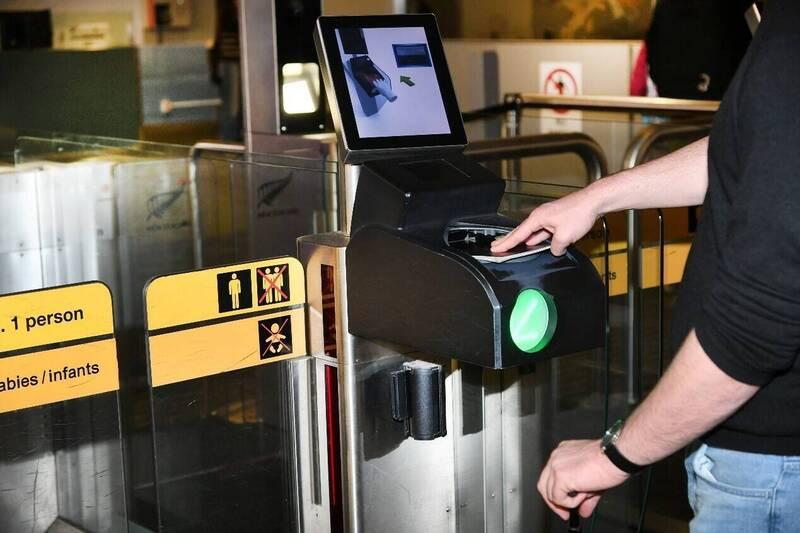New Zealand today announced that Taiwanese e-passport holders may now use the automatic e-Gate when entering or leaving the country, becoming the eighth country to permit Taiwanese to use their automatic immigration clearance system.
Currently, South Korea, Australia, Italy, Germany, Singapore, Malaysia and the US also grant Taiwanese e-passport holders e-Gate privileges, although qualifying travelers must first pay an application fee for the US e-Gate.
Taiwanese e-passport holders traveling to New Zealand who fill out the New Zealand Traveller Declaration online form within 24 hours before their flight can directly use the e-Gate at their destination, the Ministry of the Interior said.

Photo courtesy of the Ministry of the Interior
Based on principles of equality and reciprocity, Taiwan would also allow New Zealand e-passport holders to use e-Gates when entering or leaving Taiwan, the ministry said.
These reciprocal measures would be implemented at the end of next month or in December, it said.
Taiwan and New Zealand share mutual values of democracy, liberty, human rights and the rule of law, with about 60,000 people traveling between the two countries each year, the ministry said.
Reciprocally allowing travelers to use e-Gates would make travel between the two countries more convenient, fostering closer collaboration and exchanges, the ministry said.
The ministry would continue to promote reciprocal e-Gate policies with other countries, making travel more convenient for Taiwanese passport holders and attracting more tourists to come to Taiwan, it added.

Taiwanese can file complaints with the Tourism Administration to report travel agencies if their activities caused termination of a person’s citizenship, Mainland Affairs Council Minister Chiu Chui-cheng (邱垂正) said yesterday, after a podcaster highlighted a case in which a person’s citizenship was canceled for receiving a single-use Chinese passport to enter Russia. The council is aware of incidents in which people who signed up through Chinese travel agencies for tours of Russia were told they could obtain Russian visas and fast-track border clearance, Chiu told reporters on the sidelines of an event in Taipei. However, the travel agencies actually applied

Japanese footwear brand Onitsuka Tiger today issued a public apology and said it has suspended an employee amid allegations that the staff member discriminated against a Vietnamese customer at its Taipei 101 store. Posting on the social media platform Threads yesterday, a user said that an employee at the store said that “those shoes are very expensive” when her friend, who is a migrant worker from Vietnam, asked for assistance. The employee then ignored her until she asked again, to which she replied: "We don't have a size 37." The post had amassed nearly 26,000 likes and 916 comments as of this

New measures aimed at making Taiwan more attractive to foreign professionals came into effect this month, the National Development Council said yesterday. Among the changes, international students at Taiwanese universities would be able to work in Taiwan without a work permit in the two years after they graduate, explainer materials provided by the council said. In addition, foreign nationals who graduated from one of the world’s top 200 universities within the past five years can also apply for a two-year open work permit. Previously, those graduates would have needed to apply for a work permit using point-based criteria or have a Taiwanese company

The Shilin District Prosecutors’ Office yesterday indicted two Taiwanese and issued a wanted notice for Pete Liu (劉作虎), founder of Shenzhen-based smartphone manufacturer OnePlus Technology Co (萬普拉斯科技), for allegedly contravening the Act Governing Relations Between the People of the Taiwan Area and the Mainland Area (臺灣地區與大陸地區人民關係條例) by poaching 70 engineers in Taiwan. Liu allegedly traveled to Taiwan at the end of 2014 and met with a Taiwanese man surnamed Lin (林) to discuss establishing a mobile software research and development (R&D) team in Taiwan, prosecutors said. Without approval from the government, Lin, following Liu’s instructions, recruited more than 70 software